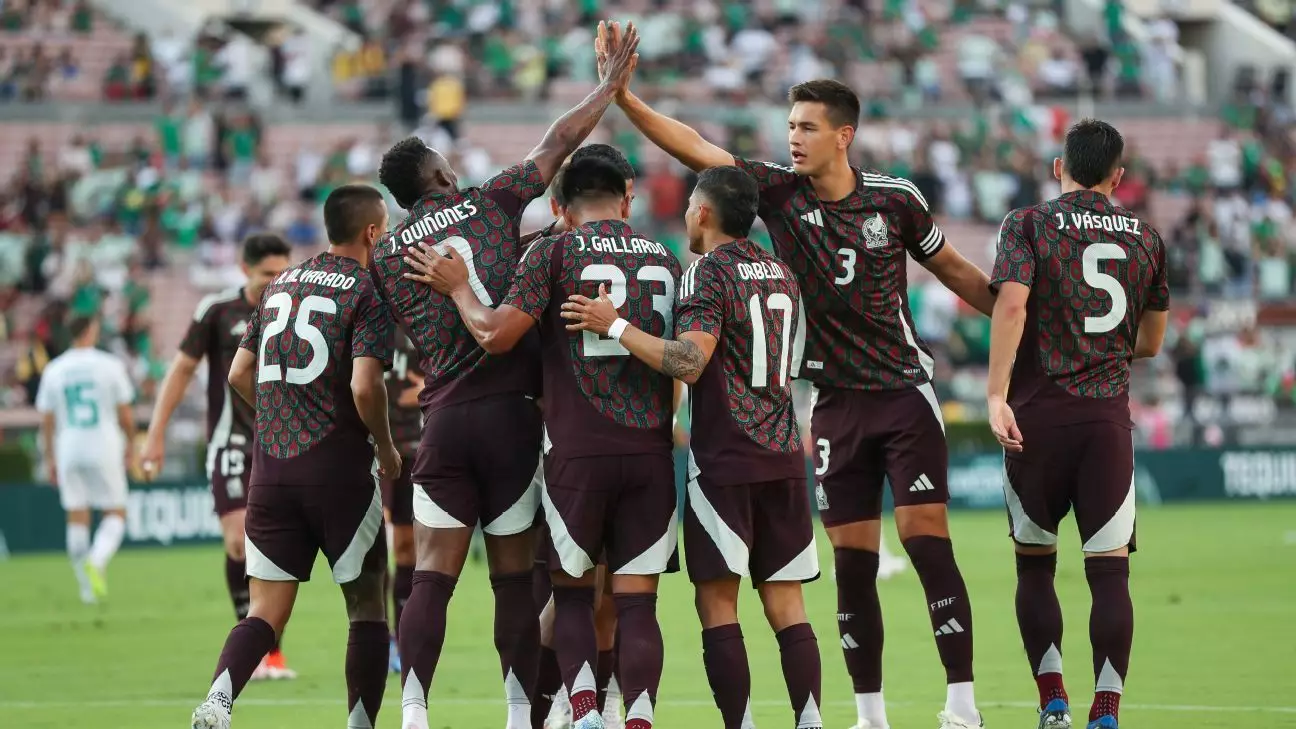As Mexico’s national soccer team embarks on a new chapter under head coach Javier Aguirre, there lies a sense of cautious optimism among fans and analysts alike. Aguirre returns to the helm of El Tri, a position he previously occupied in the early 2000s. His debut matches were met with mixed sentiments: while Mexico sealed a commendable 3-0 victory over New Zealand, a lackluster 0-0 draw against Canada raised questions about the team’s long-term trajectory. Nonetheless, there are glimmers of hope as the squad displays renewed vigor, a refreshing sight after a disheartening 2024 Copa América exit.
On the surface, the statistics paint a respectable picture. A clean sheet and an undefeated start under Aguirre’s leadership can be celebrated, yet deeper scrutiny reveals areas that require immediate attention. The lack of scoring from key players, particularly Santiago Giménez, looms large as fans wonder when the attacking prowess will manifest. Despite these challenges, initial outings provide tangible evidence that Aguirre is steering El Tri towards revitalization.
Fans often harbor mixed emotions when evaluating early results, especially following a gold-medal team’s disappointing performance. Victory over New Zealand, the 94th-ranked team worldwide, was heartening, but the absence of flair or dominance reveals a team still in transition. The subsequent showdown against Canada was nothing short of chaotic, marred by aggressive play that resulted in a flurry of fouls. However, it underscored Aguirre’s willingness to forge a competitive edge, ensuring players understand the need for toughness and tenacity, traits that have been missing from El Tri’s recent performances.
Even as the team grapples with a goal drought, Aguirre’s nonchalant demeanor in addressing the scoring issues, particularly with Giménez, suggests a strategic mindset that values collective effort over individual exploits. He emphasized that he is not concerned with who gets on the scoresheet, a refreshing perspective that fosters an environment where expressive, risk-taking football can thrive.
One of Aguirre’s most immediate accomplishments has been establishing a solid defensive backbone. The statistics highlight an impressive capability to thwart opponents’ scoring opportunities, especially against Canada, who managed a mere expected goals (xG) score of 0.26. This defensive performance can largely be attributed not only to Aguirre’s strategies but also to the on-field presence of defenders like César Montes and Johan Vásquez, who have visibly stepped up their game.
In concert with Aguirre’s tactical acumen, the influence of assistant coach Rafa Márquez cannot be overstated. His experience as a former Barcelona defender serves as an invaluable resource for instilling calm and discipline in the backline. Together, they appear to be rekindling pride in the Mexican defensive tradition, critical for competing against top-tier opponents.
Nonetheless, a sense of unease lingers beyond the pitch. Despite the performances, fans have showcased a palpable discontent regarding attendance at matches. Given Mexico’s storied history in soccer and a passionate following, the turnout has been surprisingly low, with merely 25,271 fans attending the game against New Zealand at the Rose Bowl. Such figures starkly contrast the team’s powerful legacy in the United States, often witnessing stadiums filled to capacity.
External factors undoubtedly play a role in the dwindling attendance—ranging from extreme weather conditions to the day of the week—but a larger question looms about the emotional connection between the team and its supporters. Following a disappointing Copa América venture, a rift seems to have developed. It is now up to Aguirre to not only galvanize the players but also reconnect with a fan base that requires little encouragement to rally behind their team.
As Aguirre embarks on this journey with the Mexican national team, the road ahead will certainly be laden with obstacles. Transformation takes time, particularly when evolving from a regime that faced numerous challenges. The players certainly exhibit potential, evidenced by moments of brilliance scattered across the two matches.
However, the ultimate measure of Aguirre’s success will not just hinge on clean sheets and tactical adjustments but rather how he harnesses the individual performances and turns them into consistent team play. As the El Tri community awaits further developments, there’s cautious yet palpable excitement about what lies ahead. With a focus on youth and an unwavering commitment to excellence, the vision for Mexican soccer is undoubtedly in a state of renewal.


Leave a Reply